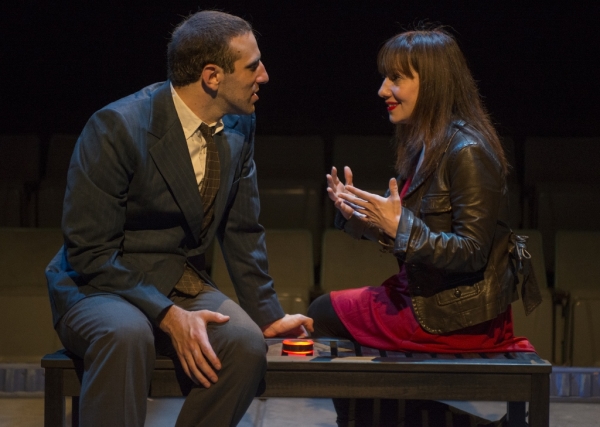Reasons to Be Happy

(© Brosilow)
The prolific playwright Neil LaBute, known for his merciless depictions of men behaving badly, isn’t quite in top form with Profiles Theatre‘s Midwest premiere of his play Reasons to Be Happy, a sequel of sorts to his Reasons to Be Pretty. LaBute’s four characters, shrill and repetitive, wear out their welcome well before the show has finished.
Although Reasons to Be Happy follows the rocky romantic relationships among the screechy quartet of Kent (Dennis Bistro), Greg (Eric Burgher), Carly (Sarah Loveland) and Steph (Domenica Cameron-Scorsese), Pretty centers on Greg, a passive-aggressive sad sack whose shallowness is equaled only by his haplessness. The production opens (similar to its predecessor) with an epic fight between Greg and Steph, set in a Costco parking lot. She’s now his ex, married and inexplicably, irrationally beside herself with fury that he’s seeing Carly, one of her oldest friends.
There’s a whiff of contrivance early on with LaBute’s frequent two-handed scenes that only gets stronger as the drama progresses. With the opening gambit, Greg spends the first third of the conversation insisting he’s leaving, that he will not engage in this particular battle at this particular time. He then spends the next third of the scene not leaving, which feels inherently artificial when you know nobody’s going to exit the room until the fight has run its course. Yet by about the third time somebody says something along the lines of That’s it! I’m not talking to you anymore!, you start to sincerely wish they’d just followed through already.
There’s another large contrivance at work here, and that has to do with Greg. That both Steph and Carly would want a long-term relationship with this duplicitous man-child begs belief. Greg is the sort of guy you want to roll your eyes at rather than spend your life with. Of course there’s no rational accounting for love and chemistry, but there’s also not a whit of either between Greg and these women. And since neither Carly nor Steph seems to be suffering from cognitive impairments, it’s impossible to believe that they’d both want this guy to commit to them.
It’s tough to even gauge the performances director Darrell Cox elicits from his cast because the characters are so underwritten. There’s only so much an actor can do with material that’s both this abrasive and this flimsy, but the actors do, for the most part, energetically try to make this unserviceable script work. Nobody, but nobody, plays hapless victims better than Burgher. He’s a passive-aggressive, squirming whiner here, someone whose feelings vacillate depending upon whom he’s talking to. Ten minutes of this and you want to throttle the guy.
As Steph, Cameron Scorsese (daughter of director Martin Scorsese) creates a feisty, slightly unhinged fire plug of a 30something, but she’s hobbled by dialogue that has her pitching one-note tantrums for the bulk of the production. Loveland’s Carly is a charismatic, intelligent single mom whose love for Greg seems about as likely as Dan Savage endorsing Sarah Palin. And as the hot-tempered Kent, Dennis Bistro turns in a performance so twitchy, the character reads as a meth head rather than somebody with anger issues.
All told, Reasons to Be Happy offers the opposite of what its title indicates.











